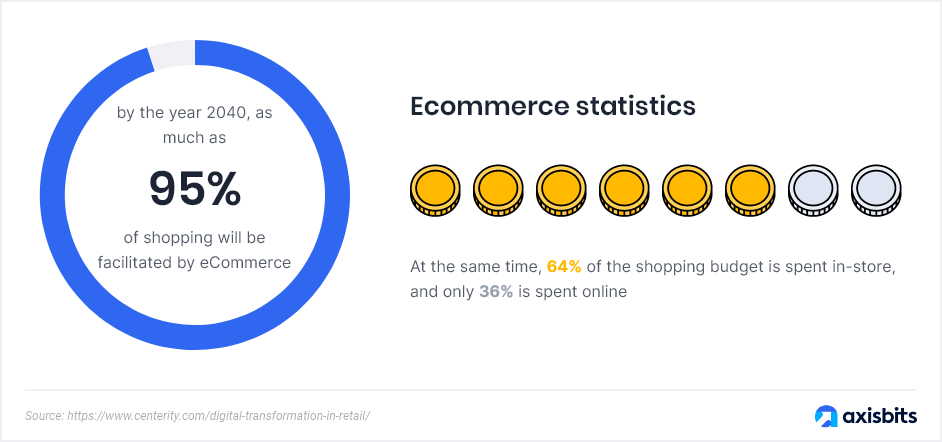While many brick and mortar stores were left reeling in the immediate aftermath of the global lockdown measures brought on by the Covid-19 pandemic, the subsequent acceleration of digital transformation may yet lead to a fruitful future for stores on a global scale.
Much of this digital transformation is being leveraged by the development of advanced fintech companies that have the ability to revolutionize many aspects of company operations across the industry.

(Image: Axisbits)
The sheer scale of transformation that’s set to take place over the next two decades is laid bare in the chart above. While 64% of consumer shopping budgets are still spent in-store, by 2040 we’re set to see 95% of purchases occur online. Such a drastic flip in spending habits will require stores to be suitably braced for significant change in the future.

(Image: Impiger)
As the chart above shows, drastic change is already underway, and retail eCommerce sales globally between 2016 and 2020 have more than doubled in total value – while the percentage of total retail sales occurring online has also climbed from 8.7% to 14.6% during the same time frame.
Although such figures may seem daunting for more traditionally oriented stores to keep up with, fintech is emerging at a scale that’s set to support digital growth for businesses looking to transition into more online environments. With this in mind, let’s take a deeper look into some of the ways in which fintech is evolving to deliver digital transformation solutions to help businesses and consumers alike:
Borderless eCommerce
Digital transformation across the retail landscape helps to make more goods available to more shoppers – even if they happen to reside in another country entirely. Fintech has already made waves in establishing a pathway in which eCommerce-based solutions are being developed to facilitate international sales – but future developments are likely to make borderless eCommerce largely frictionless in the coming months.
For instance, SWIFT GPI (Global Payments Initiative) has made it significantly easier for banks to manage and trace payments. Back in 2019, SWIFT announced a fresh GPI link for eCommerce which enabled the use of R3’s blockchain framework.
Although much focus is on supporting bank payments and activities, the development of fintech offers a fresh opportunity for large brands and individuals who reside near country borders. As fintech develops, we may find that companies can be less dependent on expanding its presence in certain countries in order to boost its reach there.
Fast and cost-effective payment solutions will make it far more straightforward for eCommerce firms to work with a range of payment providers for both their interactions with customers and their supply chain partners.
Platforms like Connectum are already looking to leverage far more efficient cross-border payments as part of its fintech solutions. The company has pioneered borderless, multi-currency processing as part of its platform – while for eCommerce stores, it’s also possible to leverage eInvoicing and one-click payments, all whilst ensuring the safety of consumers with an artificial intelligence anti-fraud system built into the service.
Over time, emerging fintechs will simplify cross-border payment management – making it easier for eCommerce stores to broaden their boundaries on an international scale.
Building on Actionable Data
Digital transformation across the eCommerce sector is also generating plenty of actionable data. Back in 2010, there were around 2 zetabytes of data created, but by 2025, this number is expected to reach 163. These masses of data can be excellent for analytical purposes, benchmarking, consumer behavior tracking or more comprehensive advertising.
Fintech is helping small businesses with the data and analytics they require to stay competitive in a digital landscape. For instance, cloud accountancy platforms can help to connect into bank account and credit card transactions to effectively track expenses and cash flow. This helps to generate a far more clear picture of financial performance to better deliver business strategies. The data can also aid small businesses in tracking their KPIs to benchmark their performance against their industry rivals.
“The implication and impact of SMB-focused fintechs is potentially huge,” explained Kate Patrick Macri, business reporter for BankingDive. ”Besides simplifying basic accounting tasks, these fintechs equip SMBs with the opportunity to grow on a global scale while ensuring efficiency and ease of access. If accounting and bookkeeping tasks are automated, SMBs can spend more time innovating and growing their business.”
Delivering Better Value Through Healthy Competition
As more emerging fintech firms enter the market and compete with their industry counterparts, we’re likely to see far greater levels of incentivization taking place. Various firms venturing into the business of payment platforms and facilitating digital transformation initiatives are likely to create more attractive deals for customers by the way of discounts and brand collaborations.
From offering cashback to flat discounts on purchases and even free movie tickets – digital payment platforms are continually looking to win over their market share by luring customers in with special offers and freebies. This has aided the growth of online shoppers and helped to boost sales further within the world of eCommerce.
With this in mind, there’s clearly plenty more to come from the relationship between fintech and eCommerce. As digital transformation continues to grow for retailers around the world, the development of financial technology is set to play a central role in sending custom online – to the benefit of the businesses and customers it serves.

